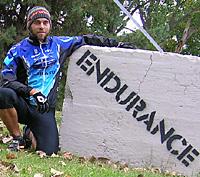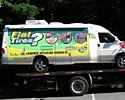
Recently on Cyclingnews.com |
MTB index page for all MTB content
An interview with Dejay Birtch, November 18, 2005
From skate park to singletrack
US national singlespeed MTB champion Dejay Birtch is not your typical polished and clean-cut cross-country mountain bike racer, but then the world of one-gear mountain bike racing is a bit more welcoming to a former skate rat who travels races in an RV that's been clapped out from new. Steve Medcroft meets one of the MTB world's great characters.
Dejay Birtch says he grew up in a rural New York town so small there wasn't much to do as a teenager. To satisfy his creative tendencies and the boundless energy of male youth, he took up skateboarding with friends. It was a pastime that let him to skirmishes with local law enforcement (who he says made skateboarding illegal just to keep busy since there was no other crime), adventures into New York city on middle-of-the-night urban jungle skating rampages and, ultimately, to Tucson, Arizona.
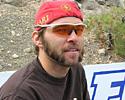
|
In Tucson, he took a job in a local bike shop while trying to piece together enough sponsorship to pursue skateboarding full time. He was introduced to mountain biking by his co-workers but considered his mountain bike something “to get me to the skate spot then home again.”
Fate decided Birtch wasn't going to be a skateboarder though. When Birtch and friends ‘liberated' a fully-rigid Raleigh mountain bike a roommate had left chained to a tree in their backyard by turning into a Singlespeed, Birtch's life took a completely different path than what he imagined for himself as a teenager.
The path has led him to one of the more unique and interesting jobs in bicycling; as road rep for Genuine Innovations (G.I.) Birtch's full-time gig is to travel the country educating dealers and retailers about G.I.'s line of C02-powered inflation products. The path has also taken Birtch deep into mountain-biking's singlespeed and 24-hour sub cultures where, in 2005 alone, Birtch won both the U.S. solo 24-hour Singlespeed National Championship and the 24-Hours of Adrenalin World Championships.
We caught up with Dejay Birtch at the U.S. Mountain Bike National Championships in mammoth Mountain, California - where he raced the Singlespeed cross-country championship - to learn about this skateboarder turned RV nomad.
Cyclingnews.com: I'm curious about the job. You're paid to travel the country in an RV? How did that come about?
Dejay Birtch: You mean who would trust me with it? (laughs). I've known the national sales manager for Genuine Innovations (Marty Mares) for a few years. I've done informal research and development for him; he'd send me a new product and I'd punish it. He'd also schwag me out with Genuine Innovations product whenever I needed it for racing. A few years down the road, G.I. were getting a few competitors so they decided it was time to step it up and actually put someone out in the field to educate the bike shops, consumers and buyers about their products. Since the company only deals with distributors – we don't sell direct to the shops – they weren't sure how they wanted to make that happen at first. Then they developed this position for me to basically go to bike shops and do educational clinics.
CN: You don't sell the product, you just show it?
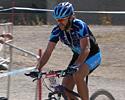
|
DB: I'm just out preaching the gospel.
CN: You knew Marty from working in a bike shop in Tucson right?
DB: I think I met him riding first but when they developed this position, I was working at Full Cycles; which was like the largest mom and pop bike shop in Arizona. They sold out to Supergo and I got a little jaded with the whole corporate bicycle shop scenario so when Marty came to me at the bike shop and said he thought I was the man for the job and they wanted me to take it, it was perfect timing.
CN: How do you select the shops you visit?
DB: The company wants me to meet up with our distributor reps and have them take me to their key accounts or bike shops in any given area. I give a clinic for the shop but at the same time, the rep gets an education they can pass on to all their shops. The bottom line is that we hope the shop places an order and the rep would be right there. As far as the schedule for this year, since I had planned to do a bunch of racing, I submitted my race plan and made that the route for the G.I shop tour.
" When I'm not on the road, I couch surf or sleep on the floor when I have to; I've got a good sleeping bag and pad”-Birtch on life on the road as the Genuine Innovations C02 guru and singlespeed racing nomad. |
CN: How have you been able to balance the travel and work responsibilities with racing?
DB: I think I got pretty lucky this year. It's a little tough knowing that you have to drive eight hours a day and try to get your spin in. I had some pretty good miles on my legs in March when I started - since I live in Arizona, I'm used to riding all year round and I was riding well in December just to gear up for 24 Hours of Old Pueblo (Tucson, Arizona in February). When I finally went out on the road for G.I., I did suicide trips first; we really needed to get all our sponsored riders their stuff for the year so I drove to the Texas NORBA to give all the pros their stuff the drove right back to Tucson. Then I did a little tour of our dealers in Southern California.
CN: You've been on the road ever since March? Do you even have an actual home any more?
DB: There's a nice little storage unit I call home (laughs). I have stuff stowed at a couple of friend's houses too and when I'm not on the road, I couch surf or sleep on the floor when I have to; I've got a good sleeping bag and pad. I'm pretty much a nomad. But that's what's cool about mountain biking; if it wasn't for this sport being the way it is and for all the friends that I've made who make it easier for me - from sleeping on the floor to handing me water bottles at races - without all those people, there's no way I'd be where I'm at.
Trading the skateboard for a mountain bike
CN: Go back to the bike shop you worked in. How long were you working in the retail side of the business?
DB: I got started in the bike shop about six or seven years before Innovations. I moved to Tucson in 1994. Three years after that I started working in a bike shop.
CN: You're twenty-nine, did you move to Tucson as a kid?
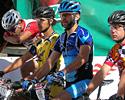
|
DB: Right out of high school, I moved to Tucson with a bunch of friends to follow a skateboarding dream. I grew up in this small town in New York where there was nothing to do. It was an hour and a half from the city. I played some sports, like soccer and tennis but I wasn't really into the team thing. I took up skateboarding with a few friends and it just won me over. It's such an artistic thing. It's all about how creative can you be. You look at everyday objects so differently than the ordinary person would. When we moved to Tucson, I was doing well and had some sponsors. I never bought a car; Tucson was such a bike friendly place, we would bike everywhere. The people that owned Full Cycle used to own a little, tiny neighborhood bike shop where I would go to get my bike fixed. I ended up stocking shelves and moving boxes around just so I could work on my bike for free. The guys there would take me out riding but I wasn't into it; I was a skater. I used my bike to get to the skate spot and that was about it. But they were relentless and never let up so finally I said ‘all right, let's do it.' At the time, these guys were racing pro on the NORBA circuit and they took me on this world-class mountain bike ride; way over my head. Thirty feet onto the trail, I went over the bars and the bike went down the side of the mountain. Literally, I took a photo of myself on this ride because that was the last time anyone was going to see me on a mountain bike. But something about it got to me. I didn't ride with those guys again for a while because I thought they were going to kill me but I started riding some of the trails around Tucson on my own. Then it escalated into those same guys convincing me I had to go do a race. Finally, there was a race right in Tucson so I did it and did really well and it set the hooks in me. I haven't looked back since; I went from skateboarding six hours a day every day to mountain biking six hours a day.
CN: You were probably fit already from skateboarding?
DB: Yeah. They complement each other really well. You get really abused skateboarding. Falling is part of the sport. It's a very muscular, full body activity; just like mountain biking. So yes, they compliment each other and trade over pretty well.
Stripping away the gears
CN: When did you start riding Singlespeed mountain bikes?
DB: Close to five years ago. My friend Aaron (who Birtch had moved to Tucson with and who ended up becoming a professional skateboarder touring with Tony Hawk's skateboard show production company) had bought a $400 Raleigh and when he went off one of his around-the-world skateboarding things and left the bike tied to a tree in our back yard. It was getting rained on and rusted so we liberated it from the tree, completely stripped it down and set it up as a Singlespeed. It had a rigid fork and only a rear brake. I started riding it to commute. It ended up being the bike I rode all the time.
CN: Your first races were on a geared bike though?
DB: Sure. And I can't even remember my first race in the Singlespeed but I started to hang out other people who were singlespeeding. They seemed to be a pretty laid back, have-fun-but-want-to-go-fast group. Not the real into-it racers, but every time you'd go out on a group ride, it would end up like a race. Everyone was making everyone else better. I did the Arizona State (cross-country) series and the occasional underground event – the kind of thing that one guy would put together and maybe thirty people would come out and try to hammer each other into the ground with the award at the end being a case of beer.
CN: Did you move up through the classes normally?
DB: I started as the beginner on the geared bike. I think I did a sport race or two on the geared bike then I did some on the Singlespeed. I've been racing expert-class geared guys on my Singlespeed lately. The endurance events are really want I'm mostly into though. I think I'm much better at the long haul.
CN: When did you do your first longer race?
Dejay's RV travel tips...
"The RV I drive is a 2002 Winnebago Railta," says Birtch. "It has about 80 square feet of space that is usually filled with boxes of product and a fridge that hasn't worked since day one. "Other special features include an air conditioner that is only good for banging your head on when you walk past it, a shower/bathroom which holds my wind trainer and my dog Juda's food and a cd player which I have to push 'on' to change the volume. "The RV has been plagued with problems non-stop since we got it. From the fixtures falling apart to a stripped axle bolt that led to the rear wheel falling off and stranding me in Vancouver, Washington. "Do yourself a favor and stay far away from RV's like this; they could kill you. "P.S. Don't rent a car from Reno, Nevada to go to Mammoth Mountain for U.S. Nationals; they cost $680.00 for three days. Trust me on this one." |
DB: I got to be good friends with a guy named Chris Latham. He used to race a lot a long time ago and we started entering 24-hour races in the duo class. It took us eight or nine races to finally win one. When we did, Chris, who had been getting out of racing when we met, was like ‘okay, we won one, I'm done.' I didn't feel right taking on another partner so the next step for me was to race solo. I did the 12 Hours of Big Bear and figured if I could do twelve, I could do twenty-four. I jumped in with both feet at the 24 Hours of Old Pueblo (in Tucson, AZ) and won again.
CN: You had quite a successful year of racing ?
DB: I wanted to do Spokane (US National Champs), Brian Head Epic (100) and Whistler and tried to organize the Genuine Innovations work around those regions of the country. I won the Singlespeed category at all three so I'm pretty happy with how it turned out – except Brian Head; which was supposed to be the endurance national championship but the day of the event, like actually after the event was over, they didn't give out a Stars and Stripes jersey (which they had done the year before). Beyond that though, I won the three biggest races endurance singlespeeding has to offer this year so I feel good.
Queue the Benny Hill music
CN: What about the one-day Singlespeed World Championships (an unofficial World Championships held in various places around the world year-to-year with the 2005 edition in State College, Pennsylvania)?
DB: It was a fun, fun race. That is something I have been aspiring to win for the last four years. The last two years have gone really well; I finished third, but this year was a bungle from the get go.
CN: How was it a bungle?
" The promoters mixed up the bikes and mine was kind of hard to find... I rode the whole race on someone else's bike!”-Birtch lost his Gary Fisher Rig at the start of the 2005 Singlespeed World Championship and finished the race on the next Rig he could find.. |
DB: I rode the whole race on someone else's bike! For the start, we were all sent (a few hundred meters) around a corner. The promoters mixed up the bikes at the start and mine was kind of hard to find (although it was perceived as an intentional shuffle of the bikes by some riders, the promoters later said they moved bikes to clear a running aisle for the first racers and some rider's bikes were inadvertently moved some distance from where the rider originally left it).
CN: You couldn't find your own bike?
DB: The LeMans run was pretty long and there were a few things working against me. To start, there were a whole of lot of purple, Rig twenty-niners out there. I ran up to the pile and the first thing I see is a dozen or more Rigs. For sure, mine's kind of unique but they all look the same when you're excited and trying to find your bike. When I circled around the pile for the third time, I figured someone else had taken it so I grabbed the next purple Rig that had Eggbeaters and went. Unfortunately, the bike was totally not my style of setup. It was a large frame and I ride a medium. It had like an 80mm stem and the seat was real low. And since all my tools and all my stuff to fix flats was on my bike I couldn't raise the seat; I just had to deal with it. I flatted twice in the race. Of course, my C02 and stuff was on my bike so I had no way to fix this one. The irony there is that I'm the C02 guy and I had no air to fix a flat so I'm stopping and begging people to get a tube or some C02 or a pump. I had to actually use a pump! Using a pump sucks after using C02 for such a long time. And the huge volume of a twenty nine inch tire too takes quite a few strokes.
CN: Did you have trouble getting a 29” tube?
DB: I didn't have to ask very many times because there were a lot of twenty-niners out there. I don't know if it was fifty percent of the field or what but it only took maybe two minutes for someone to stop and help me out. When I got back to the trailer - even with all the friends I had traveled with laughing at me - I'd yell to anyone who rode by on a Rig and say ‘hey, is that your bike?'
CN: I'm sure you were getting some funny looks?
DB: Finally, I got a reaction from this dude and Lo and Behold, he had my bike and I had his. We laughed about it and drank a beer. I actually got a $100 bottle of scotch for being the first finisher on someone else's bike and he got a frame so next year he doesn't get confused.
Back on the road again
CN: Will you be defending your championships in 2006?
DB: It can get kind of blah blah to do the same races over and over again but this was the first year I did Spokane and Whistler so I'll probably do them again next year. I'll probably be at the 24-Hours of Moab and Creampuff as well. What I'm really up for though, and what I'm trying to work out with Gary Fisher (Birtch's primary racing sponsor), is to do some multi-stage endurance racing with Cameron Chambers; Trans Alps, Trans Rockies, Cape Epic, that kind of thing. That's where the sport is going.
CN: Are you back on the road for Genuine Innovations as well?
DB: Yeah. Genuine Innovations wants me to go back out next year. And for the rest of 2005, I'll be traveling around the South East spreading the good word of powered inflation. Hopefully I'll be back in Tucson in time for Christmas and follow that up with some well deserved time off.

